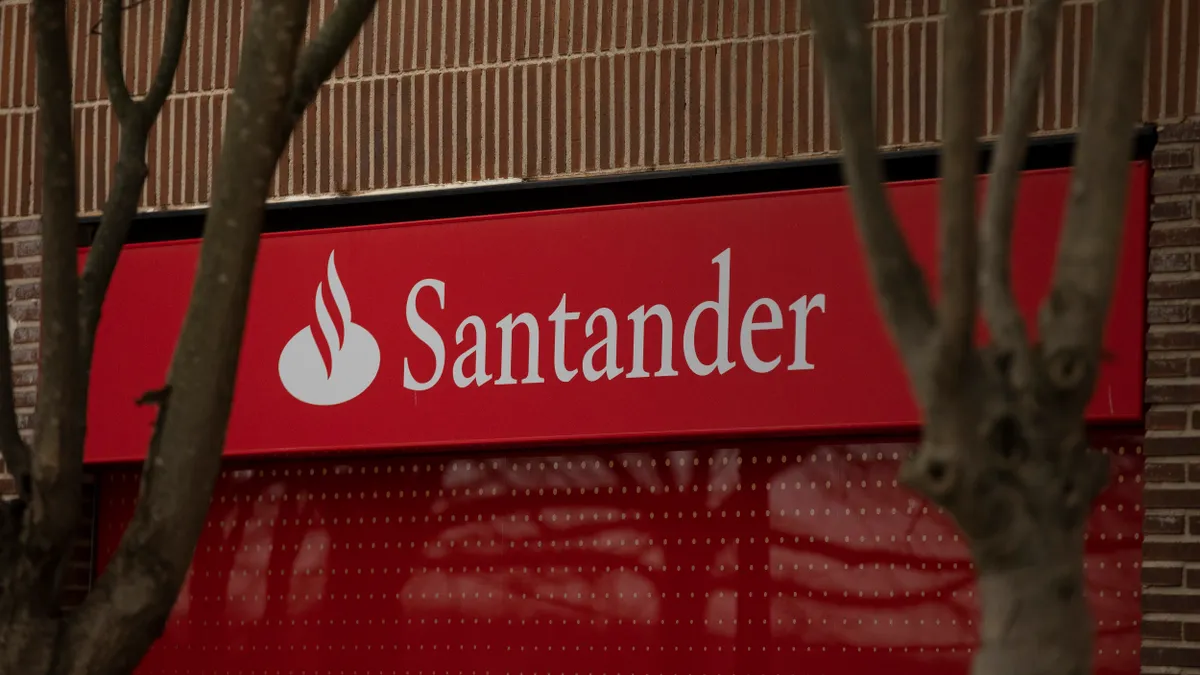Dive Brief:
- Santander Holdings USA will allow its customers to overdraw their accounts up to $100 without incurring an overdraft fee, the bank announced Monday.
- The Boston-based bank, a U.S. subsidiary of Spanish bank Santander, said the new policy applies automatically to every account holder and is expected to eliminate overdraft fees for nearly one-third of the bank’s clients who have recently overdrawn.
- The new policy comes as traditional financial institutions continue to introduce no-fee products that mirror that of fintechs, and as lawmakers and regulators urge banks to rethink the overdraft practice.
Dive Insight:
"We’re here for our clients, and we want them to know that we have their back," Pierre Habis, head of consumer and business banking at Santander, said in a statement. "They told us they need more leeway to manage the unexpected, especially during these challenging times."
The new initiative, which the bank is calling Santander Safety Net, applies to any transaction type including debit, bank-to-bank transfers and checks, Habis said.
"I’m excited to see the positive impact it will have in our clients’ daily lives," he added.
The $89.5 billion-asset bank’s new overdraft program follows a recent trend of traditional institutions revamping or doing away with the fee altogether.
Ally Bank discarded overdraft fees in June, as did Alliant Credit Union in August.
Other banks have introduced policies aimed at helping customers monitor their accounts and alert them when they are approaching a limit.
PNC Bank rolled out its "low cash mode" in April, an offering that gives the bank's customers a 24-hour buffer before overdraft fees are charged. Citizens Bank introduced a similar feature last month.
Huntington Bank introduced Standby Cash in June, a digital-only loan product the Columbus, Ohio-based bank said will help customers avoid overdraft fees and build credit. The feature gives eligible customers immediate access to a line of credit up to $1,000 with no interest or fees if they sign up for automatic payments.
Santander’s new feature also mirrors something San Antonio-based Frost Bank introduced in April. The bank’s overdraft grace feature allows customers to overdraw their checking accounts on transactions up to $100 so long as they have at least $500 in direct deposits posted to their account within the past 33 days.
Despite a nearly 10% drop from 2019, the estimated $31.3 billion in consumer overdraft revenue collected by financial institutions amid the pandemic last year has made the practice a hot topic in 2021, attracting the attention of lawmakers and regulators.
Lawmakers from both chambers questioned the CEOs of the nation’s largest banks about their overdraft policies at a pair of congressional hearings in May, and legislation that would force institutions to rein in the practice was introduced by Rep. Carolyn Maloney, D-NY, in July.
The veteran lawmaker, who has put the bill forward every Congress since 2009, said the Overdraft Protection Act would force more transparency on predatory overdraft practices.
Meanwhile, the Office of the Comptroller of the Currency (OCC) has signaled it is monitoring banks’ overdraft policies.
Acting Comptroller Michael Hsu told senators in August the agency is "looking very closely at overdrafts."
"Excessive fees on overdrafts, predatory lending, high-cost debt traps — these things shouldn't have a place in the federal banking system," Hsu said.















